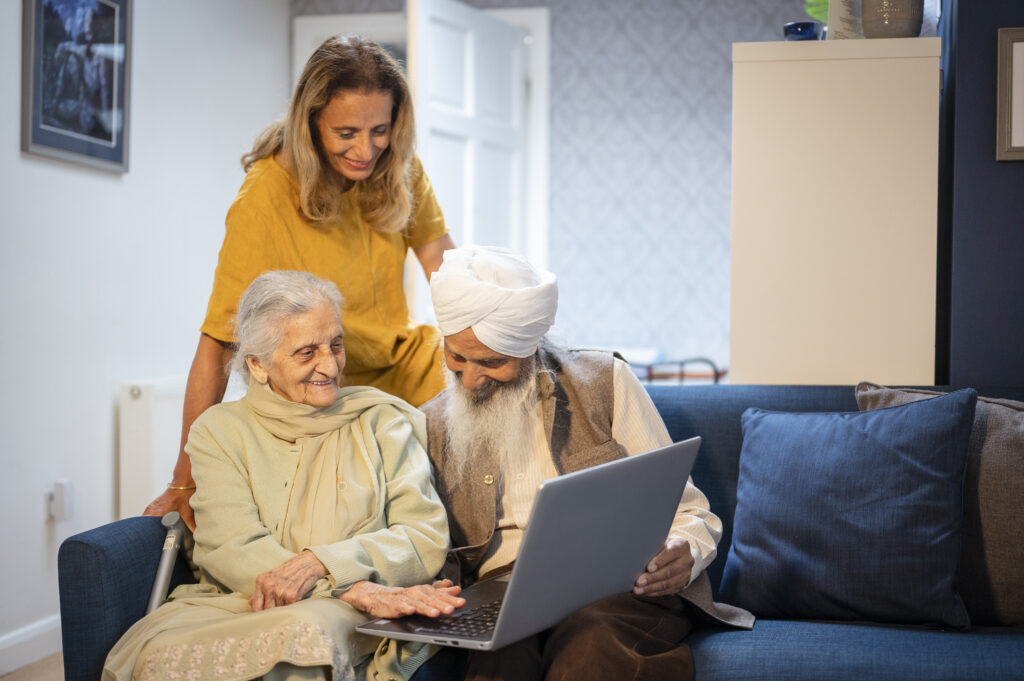
Making decisions about our lives
Being able to make our own decisions is an important part of maintaining independence and planning for the future. This may include choices about your health, where you live, medical treatments, finances or what activities you take part in.
However, not being able to access the right information on important topics such as managing finances and legal rights makes it much harder to be in control and make the right decisions about our own affairs.
These issues, together with lack of experience or knowledge – including when it comes to using new technologies – can mean older women don’t have enough confidence or understanding about how to take control of our own lives.
And there are often not many resources for older women who live in rural areas, which means extra challenges finding support.

Finding support in decision-making
No one else has the right to make your decisions for you unless you want them to. If there comes a time when you are unable to make certain decisions, or you would like some advice, others can support you.
The Council of the Aged (COTA) provides a list of resources you can look at for help making decisions about medical treatment, advance care directives, and support through this page.
They also have some videos of people talking about their experiences of self-managing home care. You can listen to Helen’s story below.
- For information about decision-making and your rights:
- Seniors Rights Victoria. is useful for Victorian-based residents
- My Aged Care has information if you need some help around the house or think it’s time to look into retirement living
- Independence Australia is a for purpose social enterprise that provides choices and support for people living with a disability or other personal needs
- The Department of Health and Human Services also provides information about care services that can be provided in the home or other appropriate location
- The Older Women’s Network provide information on what questions to ask when looking for suitable care
And the Older Persons Advocacy Network can help you with:
- Understanding and exercising your aged care rights
- Finding aged care services that suit individual needs
- Finding solutions to issues you may be experiencing with aged care providers
If you are interested in learning more about how you can be involved with advocacy of older women’s inclusion in the design of policies, you can read more about the “Where’s Lyn?” campaign, by the Older Women’s Network.
AMS (2019) Prevention of falls and fractures. Australian Menopause Society. Healesville, Vic.
Australian Human Rights Commission (2019) Older women’s risk of homelessness: background paper. AHRC, Sydney.
Feldman S, Radermacher H (2019) Vital conversations: giving older women in greater Melbourne a voice. Lord Mayor’s Charitable Foundation, Melbourne.
Field et al (2017) Walking up to one hour per week maintains mobility as older women age: findings from an Australian Longitudinal Study. Journal of Aging And Physical Activity. 25(2): 269–276.
Hillcoat-Nalletamby S (2014). The Meaning of Independence for Older People in Different Residential settings. The Journals of Gerontology.
Kirkman, Maggie (2023) Time of Our Lives: Celebrating Older Women. Monash University Publishing, Melbourne.
Kwok W, Dolja-Gore X, Khalatbari-Soltani S, et al. (2022) 488 Falls and physical activity in older Australian women from two different generations. Injury Prevention. 28: A74.
OPA Vic (2023) Your rights. Office of the Public Advocate Victoria, Melbourne.
OWNNSW (2023) Financial security and economic empowerment: older women are being left behind. Older Women’s Network NSW. Sydney.
Oxley J, Logan D, Coxon S, Koppel S (2022) Understanding current and future transport needs of older Australian drivers to guide development of sustainable and smart initiatives to support safe mobility of older adults. Sustainability. 14(10): 5906.
Pachana N, Leung J, Gardiner P, McLaughlin D. (2016) Moderating effects of social engagement on driving cessation in older women. International Psychogeriatrics. 28(8): 1237-1244.
Patterson, K (2021) National Summit on Women’s Safety: Safety and Security for Older Women. Australian Human Rights Commission.
Petersen M, Winterton R, Warburton J, Wilson J (2022) Negotiating the care convoys for a diverse group of older Australians living in rural communities: a large qualitative study. Ageing And Society. 2022 (): 1–21.
Russell S (2020) Financial abuse already hurts older people, especially women, the economic downturn now heightens the risk. Women’s Agenda. (Jun 14): 1 webpage.
Thredgold C et al. (2019) An effective homelessness services system for older Australians. Australian Housing and Urban Research Institute Limited, Melbourne. – (AHURI Final Report; 332).
United Nations (2021) A/76/157: Human rights of older women: the intersection between ageing and gender. United Nations,
WGEA (2020) Women’s economic security in retirement: insight paper. Women’s Gender Equality Agency, Sydney.
White G, Cevik M, Maglen K (2020) The system is failing older women: we need specialist services. Parity. 33(9): 27–28.
Women and Money (2023) Women’s experience with the financial sector. WIRE. Melbourne.





